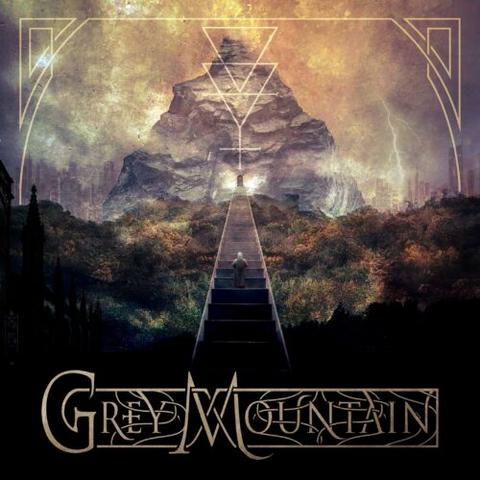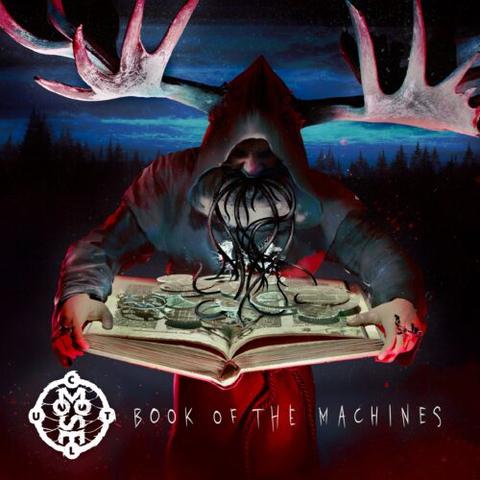Grey Mountain – Grey Mountain Review
By ClarkKent
While Grey Mountain is technically a debut, it’s the fourth project and 17th album overall fronted by Jon Higgs from the label Eat Lead and Die Music. His other bands — Monsterworks, Thūn, and Moose Cult — have all received the AMG review treatment from various writers, often noting that these many projects sound similar to each other.1 And Higgs bringing along a Monsterworks bandmate, drummer James Garnett, to Grey Mountain, does little to squash the fear of over-familiarity. However, this new act’s third member, Kishor Haulenbeek, is a n00b to the Eat Lead and Die Music roster. While Higgs brings in a well-polished prog/doom style to his sound, Haulenbeek is more raw and dissonant. Are these fresh contributions influential enough to allow Grey Mountain to stand apart from Higgs’ other projects?
Grey Mountain does sound remarkably similar to its kin, more along the lines of the progressive ideas from Monsterworks and less so the doomy ones from Thūn. But Haulenbeek does bring a unique style to the band. The guitars have a more dissonant tone, and the overall sound is much rawer. It reminds me of Opeth’s early work, like Morningrise. But where Opeth is deliberate in their songwriting, Grey Mountain feels much more free in style, as if the band members are playing in a jam session together rather than performing pre-written parts, which gives looseness that avoids easy definition. While opener “Grey Mountain” fits the doom mold, the rest of the songs are faster tempo and more playful. Grey Mountain is post/prog above all, but you will also hear some funky bass grooves and even moments of spacey psychedelia.
Grey Mountain’s unpredictable nature means that it’s not always cohesive, but it’s also never boring. The free form style is both a curse and a blessing. The individual band members play their instruments very well, but they don’t always sound like they’re playing together, as if competing in ideologies. Haulenbeek’s dissonant lines don’t always gel with the prog, and the result is jarring compared to the smoother sound of Higgs’ other works. Yet the freestyling also means songs don’t dwell for very long on any one passage, and the extensive use of elaborate guitar solos keeps things moving along. The result is both rewarding and frustrating. On two instances (“Hermitage,” “Living Mythology”), a song will begin to build momentum with incredibly catchy riffs, only for the payoff to fizzle due to a lack of direction.
The biggest issue holding back Grey Mountain, however, is the singing. Just as my head starts bobbing to the opening of “Grey Mountain,” the primary vocalist erupts in a sudden screech that sounds like someone recorded their nails scratching a chalkboard. Grey Mountain uses a dual vocalist approach (both Higgs and Haulenbeek receive credit), but it’s difficult to tell who’s who since neither sounds much like they do on other albums. One singer uses muscular death metal growls that suit the songs well. The issue isn’t just that the main vocal attack is bad, but both of the singers are inconsistent. The main guy occasionally loses his screech and actually sounds tolerable (“Hermitage”), while the harsh vocal presence loses steam on the latter half of the album. I’m normally not bothered by extreme vocals, but here they sound so off-pitch it made me cringe.
Listening to Grey Mountain, it’s clear the band had fun making this album; they’re even in talks about writing another Grey Mountain record. Perhaps what they need is additional time writing music together in order to create a more cohesive sound (and please ditch the screeches). The presence of Haulenbeek may not have moved Higgs entirely out of the umbrella of his core Monsterworks/Thūn/Moose Cult sound, and perhaps that’s okay because the prog sound allows for immense variety. While Grey Mountain may sound, at its core, like those other bands, it has enough of its own nuances to give it an identity all its own. Sadly, Grey Mountain doesn’t escape the label’s mixed reception here at AMG, but they show enough promise to break the mold next time.
Rating: 2.5/5.0
DR: 10 | Format Reviewed: 320 kbps mp3
Label: Eat Lead and Die Music
Websites: greymountain.bandcamp.com/album/grey-mountain | ampwall.com/a/greymountain2
Releases Worldwide: March 7th, 2025
#25 #2025 #DoomMetal #EatLeadAndDieMusic #GreyMountain #InternationalMetal #Mar25 #Monsterworks #MooseCult #Opeth #PostMetal #ProgressiveMetal #PsychRock #Review #Reviews #Thūn



